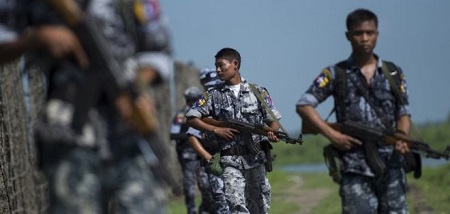A new report by Amnesty International (AI) documents a campaign of violence by the Myanmar security forces against Rohingya since 9 October 2016. Soldiers and police have randomly fired on and killed civilians, raped women and girls, torched whole villages and arbitrarily arrested Rohingya men without any information about their whereabouts or charges. AI also has released a batch of new satellite images that it says show 820 structures were destroyed between 10–18 November. These actions have been a form of collective punishment targeting Rohingya in northern Rakhine state, and may amount to crimes against humanity.
In “`We are at breaking point,’ Rohingya: Persecuted in Myanmar, Neglected in Bangladesh,” Amnesty estimates that Burmese forces have razed and burnt 1,200 Rohingya homes, and 27,000 Rohingya have fled to refugee in Bangladesh. Amnesty International says the actions of Myanmar`s military may constitute crimes against humanity after allegations of violence against the Rohingya Muslim minority.
Download report (English)
Photo: The Burmese army launched a security operation in Maungdaw, Rakhine State in October 2016, which continues to this day. Source: AFP.
Related articles:
Amnesty accuses Myanmar military of `crimes against humanity`
Rohingya villages `destroyed` in Myanmar, images show
Myanmar: Human Rights Should Be Top Priority
Myanmar: Confiscated Land Claim
Myanmar: New Land Confiscation Report
Myanmar: Protests over Land Confiscation
Myanmar: Farmers Protest against Land-Grabs
Myanmar: Army Grabs Land, Arrests Farmers
Myanmar: Dispossessed Farmers Want Justice
Rohingya: First Burning Homes, Now Border Patrols
Myanmar: Demonstrations for Land Confiscation Disputes
Myanmar: Land Battles Surface as Reforms as Unfold














